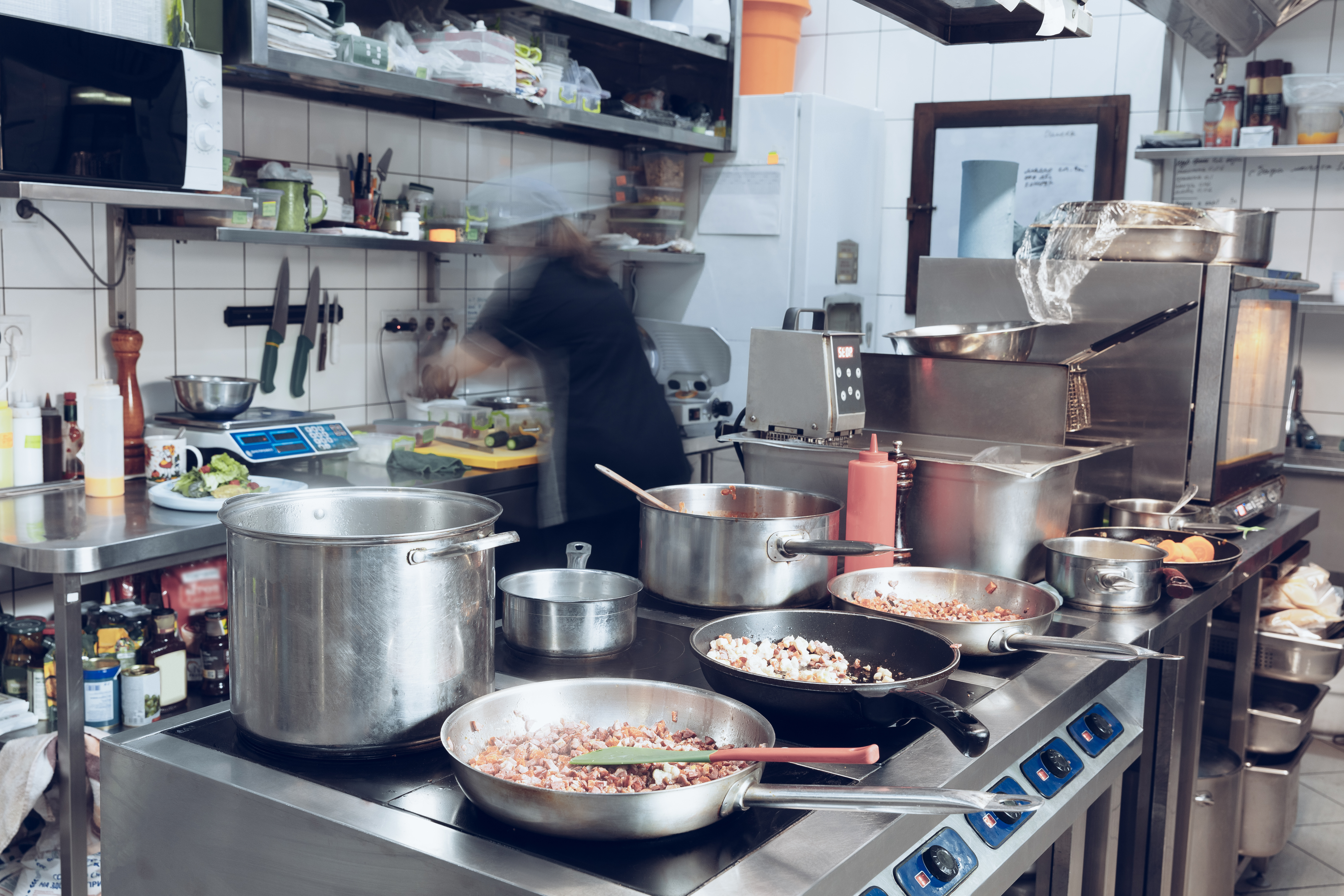How to Organize a Commercial Kitchen in 2025 - A Growth Guide for Restaurant Owners
Revolutionize your restaurant kitchen with cutting-edge tech and proven strategies! Discover how our Kitchen Display System boosts speed, quality, and efficiency to fuel your growth in 2025.

快速瀏覽
- Avoiding Common Pitfalls in Your Kitchen
- 5 Essential Strategies for a Streamlined Commercial Kitchen
- 1. Define Clear Systems and Assign Every Item a Home
- 2. Embrace Digital Labeling and Inventory Management
- 4. Prioritize Food Safety and Routine Equipment Maintenance
- 5. Foster Real-Time Communication with Technology
- Leveraging the Power of the Kitchen Display System
- An Interactive, Clutter-Free Environment
- Real-Time Order Tracking and Measurable Performance
- Tailored Order Views for Each Kitchen Department
- A Green, Sustainable Choice
- Transform Your Kitchen into a Well-Oiled Machine
In today’s fast-paced F&B industry, an organized kitchen isn’t just about aesthetics—it’s the backbone of efficiency, quality, and customer satisfaction. With evolving restaurant trends and the latest technological innovations, such as the Kitchen Display System (KDS), modern commercial kitchens are transforming into streamlined hubs of productivity.
This guide will explore common organizational pitfalls and provide actionable strategies that blend best practices with cutting-edge digital tools for a restaurant kitchen built for growth in 2025.
Avoiding Common Pitfalls in Your Kitchen
A disorganized commercial kitchen can lead to wasted time, inconsistent food quality, and even safety hazards. Many restaurants unknowingly fall into these traps:
-
Inconsistent Processes: Without clear standard operating procedures (SOPs), each team member might follow different methods, leading to uneven quality and workflow chaos.
-
Overstocking Inventory: Excessive ingredients not only risk spoilage but also clutter valuable space, hampering efficiency.
-
Neglected Equipment Maintenance: Faulty ovens, refrigerators, or other equipment can disrupt service and elevate risks.
-
Communication Breakdowns: Miscommunication between front-of-house and kitchen staff can result in lost orders and delayed service.
-
Safety Oversights: Lax safety protocols endanger staff and jeopardize the smooth running of your restaurant kitchen.
-
Food Waste: Implementing strategies like the FIFO method can prevent food spoilage and reduce costs by minimizing the disposal of unused ingredients.
-
Food Safety: Adhering to strict food safety protocols ensures compliance with health regulations and protects both staff and customers.
5 Essential Strategies for a Streamlined Commercial Kitchen
1. Define Clear Systems and Assign Every Item a Home
Establish designated storage spaces and consistent processes. Proper organization of dry storage areas is essential to keep ingredients away from heat sources and ensure food safety. Ensure every ingredient, tool, and piece of equipment has its own “home,” so your team always knows where to find—and return—items.
Organizing the storage area to keep ingredients and tools easily accessible is crucial. Proper storage of cooking tools, away from heat sources, maintains efficiency and safety. Standardizing these practices minimizes clutter and keeps operations running seamlessly.
2. Embrace Digital Labeling and Inventory Management
Modern restaurant kitchens benefit immensely from clear labeling systems. Use digital solutions integrated with your POS to monitor inventory levels in real-time, reducing waste and ensuring that only the necessary ingredients are kept on hand.
Implementing proper food storage methods like the F.I.F.O. (First In, First Out) system is crucial to maintain inventory freshness. Regular updates to labels and inventory data help prevent confusion and overstocking. Additionally, managing all the food effectively by employing strategies to prevent wastage and maintain quality is essential for the smooth operation of any kitchen.

3. Clean As You Go
A clean kitchen is a safe kitchen. Instill a habit among your staff to clean and organize their workstations as they work. The same idea applies to organizing restaurant kitchen tools, such as placing heavy items lower and lighter ones higher to enhance efficiency. This practice not only maintains hygiene but also ensures that equipment and ingredients remain easily accessible, preventing bottlenecks during peak hours.
4. Prioritize Food Safety and Routine Equipment Maintenance
Routine checks and maintenance of your kitchen equipment are non-negotiable. A well-maintained setup not only safeguards your staff but also prevents unexpected downtime. Regularly maintaining your cooking equipment is crucial to prevent service disruptions.
Ensure all team members are trained on safety protocols and that equipment is used and stored correctly. Additionally, consider the advantages of open shelving over closed storage units for efficient organization, as it enhances visibility, accessibility, and ease of cleanup.
5. Foster Real-Time Communication with Technology
In 2025, communication is key—and technology makes it effortless. Integrate systems like the Eats365 Kitchen Display System to replace handwritten tickets with digital order flows. With just a few taps, orders are sent directly from your front-of-house POS, mPOS, PhotoMenu, Scan-to-Order, or Self-Service Kiosks straight to the kitchen in real-time. This eliminates miscommunication and ensures every dish is prepared accurately and promptly.
Leveraging the Power of the Kitchen Display System
An Interactive, Clutter-Free Environment
The Eats365 KDS offers a fully interactive display that lets your chefs choose how to view orders—whether by waiting time, category, table, or chronological order. With color-coded alerts that highlight orders that have been waiting too long, your team can quickly prioritize tasks and maintain service speed.
Read more: Kitchen Display System (KDS) | Restaurant POS| East365 (eats365pos.com)
Real-Time Order Tracking and Measurable Performance
By recording the exact time orders are received and bumped, the KDS provides valuable insights into your kitchen’s efficiency. Efficient order tracking is crucial in commercial kitchens to maintain service speed. This data allows you to:
-
Monitor staff performance.
-
Identify and address bottlenecks.
-
Refine your menu by pinpointing items that consistently delay service.
-
Ensure food safety by maintaining strict sanitation measures.
Read more: 10 Major Advantages of a Cloud-based POS System for Restaurants (eats365pos.com)
Tailored Order Views for Each Kitchen Department
Not every station needs to see every order. With customizable settings, the KDS ensures that each kitchen department receives only the relevant orders. Equipping each cooking station with appropriate technology, such as digital kitchen order systems, further reduces confusion.
A Green, Sustainable Choice
Switching to a paperless system isn’t just modern—it’s eco-friendly. By eliminating paper tickets, you contribute to a greener operation, appealing to environmentally conscious customers while streamlining your processes.
Additionally, reducing food waste through proper inventory management and organization can further enhance your green initiatives. Efficient use of storage space also supports sustainable practices by ensuring that ingredients and tools are stored properly, reducing the need for frequent replacements.
Transform Your Kitchen into a Well-Oiled Machine
An organized, tech-enabled restaurant's kitchen is more than a trend—it’s a competitive advantage.
By combining robust operational practices with innovative tools like the Eats365 Kitchen Display System, your restaurant can improve speed, enhance food quality, and boost customer satisfaction. A well-organized restaurant’s kitchen plays a critical role in enhancing productivity and customer satisfaction.
Additionally, a properly designed dining room in relation to the kitchen layout ensures a seamless guest experience. Whether you run a quick service restaurant, a full-service establishment, a bar, or even a cloud kitchen, embracing these strategies will set you on a clear path to growth and excellence in 2025.
Ready to transform your kitchen? Get in touch with us today to learn how our integrated POS and KDS solutions can drive efficiency and elevate your restaurant’s performance.